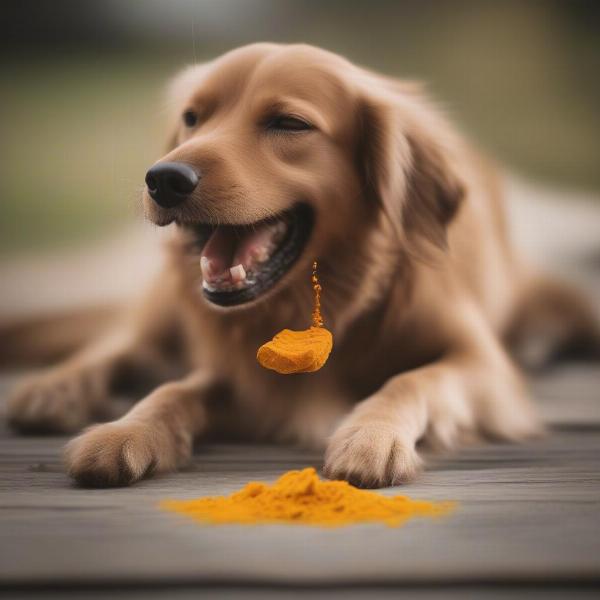Turmeric has gained popularity as a natural supplement for both humans and their furry companions. But can you safely give your dog those turmeric capsules you have in your medicine cabinet? The short answer is: it’s complicated. While turmeric itself can offer potential benefits for dogs, human capsules may contain ingredients not suitable for canine consumption and the dosage may be incorrect. This article will explore the benefits and risks of turmeric for dogs, explain why human turmeric capsules might not be the best choice, and guide you on how to safely supplement your dog’s diet with turmeric.
Understanding Turmeric and Its Potential Benefits for Dogs
Turmeric contains curcumin, a compound known for its anti-inflammatory and antioxidant properties. These properties can potentially help dogs with conditions like osteoarthritis, allergies, and even certain types of cancer. Some studies suggest turmeric can improve joint function and reduce pain in dogs suffering from arthritis. It may also aid in boosting the immune system and protecting against cellular damage.
Why Human Turmeric Capsules Might Not Be the Best Choice
While turmeric itself can be beneficial, human turmeric capsules are often formulated with other ingredients, such as fillers, binders, and even other herbs or spices, that may not be safe for dogs. Some capsules may also contain high concentrations of curcumin, which can cause digestive upset in dogs. Additionally, the dosage in human capsules is designed for human body weight and metabolism, and could be too high for a dog, especially a small breed.
Safe Alternatives for Giving Turmeric to Dogs
So, how can you give your dog the potential benefits of turmeric without risking their health? There are several safer options:
- Turmeric Powder specifically for dogs: Look for products specifically formulated for canine consumption, ensuring they are free from harmful additives and have appropriate dosage recommendations.
- Golden Paste: You can make golden paste at home using turmeric powder, coconut oil, and black pepper. Black pepper enhances curcumin absorption. turmeric powder dosage for dogs provides guidelines for creating golden paste and appropriate dosages.
- Turmeric Treats or Chews: These are a palatable and convenient way to administer turmeric, ensuring correct dosage and often incorporating other beneficial ingredients. best dog joint supplement australia offers a selection of high-quality joint supplements, including those containing turmeric.
When to Consult Your Veterinarian
Before adding any supplement to your dog’s diet, consulting with your veterinarian is crucial. They can assess your dog’s overall health, discuss potential benefits and risks, determine the appropriate dosage, and monitor for any adverse reactions.
Signs of Turmeric Intolerance in Dogs
While turmeric is generally safe for dogs, some might experience side effects like digestive upset (vomiting, diarrhea), or allergic reactions (itching, skin rash). If you notice any of these signs, discontinue use and consult your veterinarian.
Is Turmeric Right for My Dog?
Whether turmeric is suitable for your dog depends on their individual health condition and needs. While it offers potential benefits for some dogs, it’s not a one-size-fits-all solution. Always prioritize your veterinarian’s advice and choose turmeric products specifically designed for dogs. dog joint pills explores various joint supplements for dogs, offering a broader perspective on managing joint health.
 Dog Eating Turmeric Treat
Dog Eating Turmeric Treat
Conclusion
While you should avoid giving your dog human turmeric capsules due to potential risks, there are safe and effective ways to incorporate turmeric into their diet. Always consult your veterinarian before starting any new supplement regimen, and opt for dog-specific turmeric products or homemade golden paste with proper dosage. By taking these precautions, you can safely explore the potential health benefits of turmeric for your furry friend. hip and joint supplements for dogs offers a comprehensive guide on choosing the best joint supplements for your canine companion.
FAQ
- Can I sprinkle turmeric powder on my dog’s food? While it’s not harmful, turmeric powder on its own has poor bioavailability. Mixing it with a fat source like coconut oil improves absorption.
- How much turmeric should I give my dog? The appropriate dosage depends on your dog’s size and health condition. Consult your veterinarian for guidance.
- Are there any drug interactions I should be aware of with turmeric? Turmeric can interact with certain medications, such as blood thinners. Discuss any potential interactions with your vet.
- Can turmeric stain my dog’s fur? Topical application might stain light-colored fur. Oral consumption is less likely to cause staining.
- What are the signs of a turmeric allergy in dogs? Itching, skin rash, vomiting, and diarrhea are potential signs of an allergy.
- Can puppies have turmeric? Consult your veterinarian before giving turmeric to puppies.
- How long does it take to see the effects of turmeric in dogs? It may take several weeks or even months to observe noticeable benefits.
ILM Dog is your go-to resource for expert advice on dog care and nutrition. We offer comprehensive guides on breed selection, health care, training, nutrition, grooming, and much more. Our team of experienced dog professionals is dedicated to helping you provide the best possible care for your furry friend. For expert advice tailored to your dog’s individual needs, contact us via email at [email protected] or by phone at +44 20-3965-8624. ILM Dog is here to support you and your canine companion on every step of your journey together.